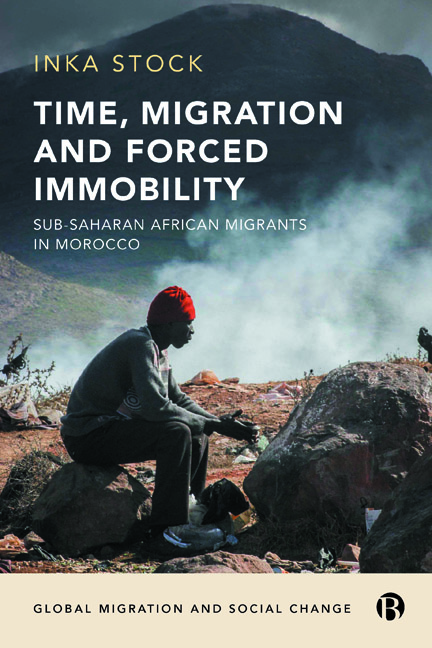Book contents
- Frontmatter
- Global Migration And Social Change
- Contents
- List of Figures and Tables
- Acknowledgements
- Series Preface
- 1 Introduction
- 2 EU Externalization Policies and their Impact on Migrants in Morocco
- 3 Travelling Adventures: Migration as an Existential Quest
- 4 Arriving in Morocco: Becoming Trapped in a Context of Uncertainty
- 5 Facing Time and the Absurd
- 6 Migrant Communities in Morocco
- 7 Waiting in Desperate Hope
- 8 Conclusion
- Bibliography
- Index
3 - Travelling Adventures: Migration as an Existential Quest
Published online by Cambridge University Press: 30 April 2022
- Frontmatter
- Global Migration And Social Change
- Contents
- List of Figures and Tables
- Acknowledgements
- Series Preface
- 1 Introduction
- 2 EU Externalization Policies and their Impact on Migrants in Morocco
- 3 Travelling Adventures: Migration as an Existential Quest
- 4 Arriving in Morocco: Becoming Trapped in a Context of Uncertainty
- 5 Facing Time and the Absurd
- 6 Migrant Communities in Morocco
- 7 Waiting in Desperate Hope
- 8 Conclusion
- Bibliography
- Index
Summary
Introduction
In this chapter I will look at the reasons why people migrated to Morocco and the ways in which their journeys evolved by relying on migrants’ own accounts of their travels. I will analyse both men's and women's journeys, indicating significant similarities and differences within them. I contend that this helps to analyse migration, its causes, and migrants’ journeys from a standpoint that goes beyond a mere economic perspective on human mobility. By reviewing Sub-Saharan African migrants’ conditions of departure and the variety of regulatory authorities (market, state and family) that structure their movement I will show how aspirations and capabilities to migrate are produced and reproduced not only at the point of departure, but also along the way. I conclude that on their way to Morocco, the status of migrants can shift from legal to illegal, forced to voluntary or trafficked to smuggled, and the amount of control they have over these processes changes with the places they travel to and the time they spend there. The particularly long journeys I describe significantly shape the experience of migration and mark migrants’ gendered identities in a way that the ordinary everyday movements of people do not. In fact, the migration processes described here are full of vital conjunctures, which are zones of possibility that emerge around specific periods of potential transformation in life (Johnson-Hanks 2016: 7). According to Johnson-Hanks (2016: 7), vital conjunctures are particularly critical moments when more than usual is at stake. They are outside of normal time in that they no longer entail the expectation of a particular trajectory which would lead to a particular future in some ordered way (Johnson-Hanks 2002).
These processes shape migrants’ outlook on life and their life course. They bring to the fore how migration for them is best seen as an existential quest, rather than a mere movement from A to B. Migrants change not only their physical location but also their social location (Pessar and Mahler 2003, Hage 2009a, Stock 2012) and their aspirations and expectations of the future are shaped by these experiences (Johnson-Hanks 2002).
- Type
- Chapter
- Information
- Time, Migration and Forced ImmobilitySub-Saharan African Migrants in Morocco, pp. 37 - 64Publisher: Bristol University PressPrint publication year: 2019



